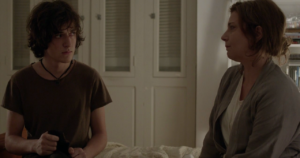 Review: One Night Only
Review: One Night Only
Don’t Call Me Son | Anna Muylaert | Brazil | 2016 | 88 minutes
Spotlight Cinema, Madison Museum of Contemporary Art, Wednesday, November 16, 7:00pm»
Grant Phipps examines the latest film from Brazilian filmmaker Anna Muylaert, Don’t Call Me Son, in which a gender bending teenager finds new social circumstances when his biological mother reclaims him.
“Imagine living in a tropical country where the sun is dark,” an urban high school literature professor suggests while discussing the work of Brazilian poet Carlos Drummond de Andrade. One student, androgynous artist-rocker Pierre Almedia (Naomi Nero), remains oblivious to the strife and chaos of Drummond’s “Sentiment of the World” as he flirts with a female classmate and doodles when called upon.
This early scene in Anne Muylaert’s second feature film, Don’t Call Me Son, foretells topsy-turvy events in the isolated Brazilian bourgeois community where Pierre will soon reside and the disassociation and subtle oppression that characterizes his general precariousness and reticence to declare his gender identity. In his attire and actions, Pierre flaunts an almost-anarchic artistry and fluid sexuality in his preference for both men and women. As the young teen steadily seeks out his myriad of desires, he is suddenly transported to a (literally) gated community and cannot fathom the restrictive social conventions.
Spiritually following The Second Mother (2015), which also tackles timely issues of class within strained Brazilian families, Don’t Call Me Son feels more direct in its condemnations of close-mindedness. Its sympathies are more apparent, however, in the traumatic upending of a working class home. Pierre and his younger sister Jacqueline (Lais Dias) learn after a DNA test that they were stolen as infants by their “mother,” Aracy (Daniela Nefussi).
The teary-eyed joy of their sheltered biological families contrasts immediately with the devastation exhibited by Pierre and Jacqueline as their independent existence comes to an end. In the film’s warm, sharp, but measured rhythm, Muylaert progressively embraces a metaphorically wide shot in the distant relatives and legal services involved, including tenacious aunt Iara (Luciana Paes) and social assistant-psychologist Sueli (Helena Albergaria).
While this inclusive focus throughout its succinct eighty-minute run-time may seem incomplete, Don’t Call Me Son succeeds in its surprisingly varied points of view while always returning to Pierre. As if peripherally modeled after a film like Gus Van Sant’s Elephant, each scene possesses an aesthetic and emotional directness- even one that validates the perspective of the press, who attempt to interview Pierre (born Felipe, a name he rejects) as the news breaks of the familial custody debacle.
In order to ascertain and contrast this uninvited reality, Muylaert then tenderly turns to the more traditionally masculine proclivities of biological brother Joca (Daniel Botelho), which are instantly validated by his parents. However, as scenes unfold in a martial arts class and at school with his peers, Joca’s private frustrations are revealed to be not altogether divergent from his brother’s estrangement, providing an unexpected depth to his character.
This scope is further compounded by the assured, if not quite Hitchcockian, dual performance of actress Nefussi as Aracy and birth mother, Glória. In Aracy’s final appearance, turning her back to the camera in the jail cell (a shaggy smoker with floral clothing and tattoos), she reemerges, just minutes later, almost unrecognizably as the nervously clean-cut Glória, draped in white and beige garments from her shoulder-length brunette hair.
Through Nefussi and Nero’s haunting chameleonic performances, Don’t Call Me Son‘s deliberate construction is sustained. In the absence of father Matheus (Matheus Nachtergaele) and Glória’s intimacy and familiarity with Pierre, it’s Muylaert’s intent to define their love as a series of sincere if tragically misguided attempts to help him assimilate on their terms.
Matheus and Glória’s inability to see past their ideal image of their long-lost son tumble over into his relationships with bandmates, triggering further lethargy in his day-to-day interactions. And while Pierre initially exerts a small if conscious effort to cover up and excuse the feminine aspects of his personality, he soon recognizes that, without a real means of escape, he must invalidate his birth parents’ transphobia by any means.
Occasionally dizzying slow-motion sequences set to atmospheric pop and electro-swing music of the first two acts yield to an explosive bowling alley confrontation between Pierre and his new family. Within this penultimate scene, relentlessly shot at close-up, Don’t Call Me Son favors a searing neo-realist tone reminiscent of the Dardenne Brothers’ most potent work. While Pierre castigates Matheus and Glória’s imposed identity and normalized definition of family in only terms of blood, the film then pauses for a chance at reconciliation and belonging. Through a silent, supportive gesture, Muylaert and the youth coming of age in her film, cling to resilient hope.